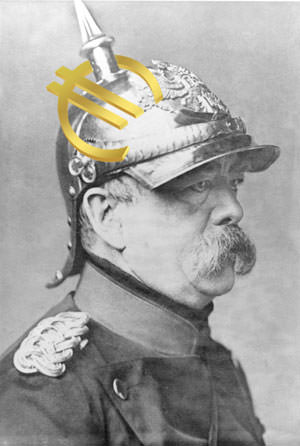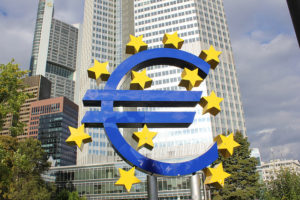Germany Dominates Europe Once Again
Germany, as we all know, is a problem -- especially a disproportionately powerful and united Germany. (Update)
VIENNA — The great economic crisis has given birth to a smaller and tighter monetary union in Europe, under the influence of a Germany that is undergoing a certain estrangement from its European partners. This amounts to a possibly dangerous wager on what the European Union will ultimately become, which all may not like.
In Vienna last weekend, the World Policy Conference, founded by the French Institute of Foreign Relations as a vehicle of European communication and cooperation with the so-called BRIC nations (Brazil, Russia, India and China) and other states in the developing world, found its attention riveted on Brussels and the euro-zone states of the EU. A French official who was part of the nearly all-night discussion in Brussels flew to Vienna to brief the gathering there, where decidedly mixed feelings were expressed about this successful German imposition of its own economic norms on an EU in distress.
Germany, as we all know, is a problem — especially a disproportionately powerful and united Germany. NATO was formed to keep Germany down, and only after that to keep the Russians out and the Americans in. Keeping Germany down meant finding a way to contain and integrate it into a Western Europe to which it had never in the past fully belonged. Its Christian knights of the Holy Roman Empire, and its trader-merchants, were off exploring the Baltic East, converting pagans and establishing free Hanseatic cities.
The concern in 1945 was that Germany could eventually reclaim the European domination first achieved under Bismarck, who created a united and imperial Germany in 1871. It lost that domination by defeat in the First World War, and its devastation was achieved in the Second by the Soviet army and British and American firebombing of Germany’s cities — the consequence of Hitler’s war to give Germans “living space” (Lebensraum) and racial triumph by conquering Eastern Europe and subjugating its “inferior” Slavic peoples.
Western and Eastern Europeans wanted no such third German effort to dominate the continent. Stalin created his rampart of states under Russian control, separating Occupied Germany from Russia. NATO was the American-led answer, a defense alliance that eventually turned into an American quasi-occupation of Western Europe, which still continues, although eroding.
The Europeans searched for a permanent rather than temporary solution to Germany. They found it in the idea, promulgated by the French banker Jean Monnet, formally proposed to Germany’s Chancellor Konrad Adenauer by the French government, of Germany’s integration into what was meant to be an unbreakable political association, sealed by joint control of Western Europe’s resources and the industrial capacities essential to war.
This was the European Coal and Steel Community created by the Treaty of Paris in 1951, in which France and Germany were joined by the Benelux states and Italy. When Monnet presented the proposal to Adenauer, the latter replied: “I have waited 25 years for a move like this. Germany knows that its fate is bound up with that of Western Europe as a whole.”
Those who were active in European and American foreign relations during the early postwar years find the Brussels agreements a triumph of that solidarity. As Jean-Dominique Giuliani of the Robert Schuman Foundation put it, the outcome was the expression of “a political determination to break with the spiral of doubt, indecision and division.” For those who have seen EU expansion in membership, powers and authority as essential to Europe’s peaceful future, this has been a critical event, coming at a moment when the EU seemed to face breakup at worst and a crippling failure at best.
For those, on the other hand, who have felt unease at the scope of ambition found among the Eurocrat establishment in Brussels, believing expansion of the EU and its powers to be the essential goal, this seems a possible step too far.
A series of meetings among leaders and government officials, lacking a mandate to go as far as they have now committed their states to go in advancing the integration of Europe, recalls the unhappy effort to provide Europe with a constitution, rejected by the Netherlands and France. The Brussels agreements again include constitutional revisions in the individual states.
A few weeks ago, Greek Prime Minister George Papandreou proposed calling a referendum on these matters to clarify his popular mandate and was told by the French and German governments that this could not be tolerated. When Ireland staged its referendum on the Lisbon Treaty, the people said “no.” Brussels and nearly all the EU governments ordered the Irish to go back and think again, and produce an “acceptable” outcome.
The Brussels agreements impose a lasting program of economic austerity on EU citizens that reflect the conventional monetarist doctrines of recent decades, the ones that led to the current crisis. Keynesianism is still under intellectual ban. The creation of growth and popular well-being in nations is subordinated to notions of national discipline and sacrifice, reassuring to Germans.
The unprivileged citizenry are expected to provide the sacrifices.
Britain of course has chosen otherwise, since the City rejects “statist” Europe. Whether this is a good choice or not, it was the inevitable one. As Jonathan Powell has written in the Financial Times, Britain has sought a leading role in Europe while rejecting European involvement in its own affairs ever since the Battle of Waterloo.
Visit William Pfaff’s Web site for more on his latest book, “The Irony of Manifest Destiny: The Tragedy of America’s Foreign Policy” (Walker & Co., $25), at www.williampfaff.com.
© 2011 Tribune Media Services, Inc.
Update: The author of this column attached the following note to his most recent essay:
My article last week on the European Union and Germany, for the first time in more than three decades of publication, evoked a unanimously hostile response from those who read my columns in newspaper syndication or online, and who troubled to reply either directly to me by way of my website, or indirectly as comment on its publication in the web magazine truthdig.com.
These replies were all roughly parallel in protesting what to me had been a statement of an objective political problem concerning Germany, with roots in European history, which was interpreted as a forecast or warning of a new Hitler, or some other renewal of German expansionism. I had written that Germany historically has “been a problem” to its West European neighbors because of its population, and its well-known economic dynamism.
I presented this as a problem generally recognized by the members of the EU, suggesting that Germany’s current determination to impose its own conservative economic norms on all the EU euro-using countries was probably impractical, impolitic and would make trouble (as proved to be the case, provoking the British rejection of the Brussels agreements). It was the Eurocrat expansionism and enthusiasm for federalist solutions that I mainly criticized.
I believe the German government has done no service to the EU by its insistence upon what many, like myself, see as an obsolete form of fiscal rectitude. Its obstinate insistence upon Bundesbank-style limitation on the independence of the European Central Bank prevents the ECB from assuming the role of lender of last resort, the role traditionally played by most national central banks.
Furthermore, as many have pointed out, if the ECB were authorized to embark on a program of “quantitative easing,” as currently practiced by the U.S. Federal Reserve and the Bank of England, this would go a long way towards solving the present impasse. However this is anathema to the Germans, who insist that the ECB put up “real money” to guarantee European sovereign credit.
This provoked Nicolas Sarkozy even to propose borrowing from China: an increasingly unstable state whose own economy is deeply backward by comparison with that of the EU eurozone, relying mostly on low-value-added export manufactures. China has a huge trade surplus, but its GNP per capita (according to 2010 IMF figures based on purchasing-power-parity in current international dollars) is merely $7,544.
The European Union’s is $30,455; Belgium’s is $36,274; Germany’s $36,081; France’s $33,910; Spain’s $29,830; Italy’s $29,480 — and Greece’s $28,496. Why should such rich countries beg from China?
Your support matters…Independent journalism is under threat and overshadowed by heavily funded mainstream media.
You can help level the playing field. Become a member.
Your tax-deductible contribution keeps us digging beneath the headlines to give you thought-provoking, investigative reporting and analysis that unearths what's really happening- without compromise.
Give today to support our courageous, independent journalists.



You need to be a supporter to comment.
There are currently no responses to this article.
Be the first to respond.